The Editor Discovers Her Remarkable Ancestors
- Details
- Category: Featured Resident
- Published on Monday, 13 August 2018 10:09
- Written by Dianne Lawrence
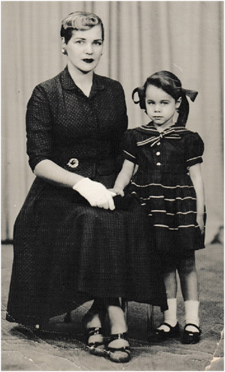 I was born out of wedlock in 1951 to a beautiful Latvian immigrant woman, Inta Penka. In 1940 when the Russians invaded Latvia, my mother, a young teen, was immediately sent home from her ballet school in the city but the boat she took did not drop her off at her port. The captain realized this was a last chance to get out and instead escaped across the Baltic along with the passengers. Mom would never see her parents again but she also escaped witnessing the seizure of her parents' land and being sent to Siberia, along with her mother and sister, for five years. Inta eventually made her way to Canada where I was conceived and born, out of wedlock.
I was born out of wedlock in 1951 to a beautiful Latvian immigrant woman, Inta Penka. In 1940 when the Russians invaded Latvia, my mother, a young teen, was immediately sent home from her ballet school in the city but the boat she took did not drop her off at her port. The captain realized this was a last chance to get out and instead escaped across the Baltic along with the passengers. Mom would never see her parents again but she also escaped witnessing the seizure of her parents' land and being sent to Siberia, along with her mother and sister, for five years. Inta eventually made her way to Canada where I was conceived and born, out of wedlock. Five years after I was born, Mom married my stepfather, Irving Lawrence. They'd had another child together prior to this marriage but weren't ready to marry so he was given up for adoption. A few years later they decided to marry and had two more children, Sam and Phyllis. (To my great joy, brother Scott Vale recently found his way to us but that's another story).
When you're a child, words like stepfather, marriage, out of wedlock, and adoption are all complicated terms better left explained when one was "older." Like most kids, I was simply a passenger on the grown-ups' road trip, but when I was eight years old my mother decided it was time for me to know about my "real" father. She explained that he was different than the dad I had come to know. She told me his name was Duke Page and he was a professional piano player. She made a point of letting me know how much they loved each other but when he returned to America (we lived in Canada), she couldn't join him there. Although I never harbored a burning desire to find him, these details stayed with me, and in my 30s I approached a discussion with her about it. Afraid that I might want to find him, she vehemently denied all the information and claimed none of it was true. I let it go and resigned myself to never knowing. She passed on in 2008 having kept her secrets. Except for his name. When the internet and Google became a resource, I tried to research but nothing came up. So, Duke Page remained a ghost, a blurry, mysterious, shapeless presence standing on the distant horizon of my psyche.
That is, until this year, when I did Ancestry.com. First I discovered that I was 24% African American with roots in Nigeria, Benin and Toga. I am very light skinned and grew up in Canada in a white family and community. Despite my curly hair and slightly olive skin, the issue of being mixed race was never mentioned. By anybody, ever ... that is until I moved to an African American community in LA and my neighbors kept telling me I looked like a relative. So I just began to assume I was mixed race - but now I knew for certain and it felt comfortable and right. It made sense.
Ancestry also links you to anyone who shares your DNA, and many 4th, 5th and 8th cousins immediately showed up, yet all too distant to link any of them with Daddy Duke until …. a second cousin with the last name of “Paige” appeared. Tracy Paige Jr..At first I didn’t take notice because I’d been spelling Duke’s last name as Page. When I realized what I had, I gasped and hastily wrote an email explaining what I knew, begging forgiveness for reaching out and wondering if there was any information he might be willing to send me. I understood the discovery of another sibling, another child, another unexpected family member out in the world could be very disruptive. The parent may not want this information exposed. But I had to ask, so I held my breath, crossed my fingers and waited. After a week I got a response.
 Tracy Paige Jr. had gone to his dad, Tracy Sr., who, I discovered, was one of thirty cousins! Jr. shared this mysterious email with his dad and my other cousins. Was it a hoax? They encouraged him to contact me. So I woke up one morning to an email with a photo of my dad, Deutrelle Paige, aka Duke, tall, handsome, beautifully tailored and standing next to a woman at some kind of zoo. He had a sketch pad under his arm (I’m an artist!) and he's looking toward the camera with a "Here I am, you finally found me" look on his face. Sadly, he had passed in 1996 and all my uncles and aunt had already passed on. Yet every light in my body exploded. The ghost had an outline and was close, was looking at me. Looking like me. A door opened up, I stepped in and discovered a treasure trove of family love and lore, remarkable information about my heritage and roots. I began to flesh in the outline.
Tracy Paige Jr. had gone to his dad, Tracy Sr., who, I discovered, was one of thirty cousins! Jr. shared this mysterious email with his dad and my other cousins. Was it a hoax? They encouraged him to contact me. So I woke up one morning to an email with a photo of my dad, Deutrelle Paige, aka Duke, tall, handsome, beautifully tailored and standing next to a woman at some kind of zoo. He had a sketch pad under his arm (I’m an artist!) and he's looking toward the camera with a "Here I am, you finally found me" look on his face. Sadly, he had passed in 1996 and all my uncles and aunt had already passed on. Yet every light in my body exploded. The ghost had an outline and was close, was looking at me. Looking like me. A door opened up, I stepped in and discovered a treasure trove of family love and lore, remarkable information about my heritage and roots. I began to flesh in the outline. 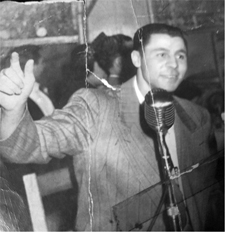 He had been a professional musican/piano player and although he'd married five times he had no natural children with any of his wives. I apparently was his only known child.
He had been a professional musican/piano player and although he'd married five times he had no natural children with any of his wives. I apparently was his only known child. My cousins assured me that he loved children and had he known about me I would have spent summers in Norfolk, Virginia, surrounded by dozens of cousins.
With their encouragement I made plans to fly out to Norfolk and visit, which I did this July. It was a life changing experience.
Before I left for Norfolk, Laura Meyers, our West Adams historian, was fascinated with my 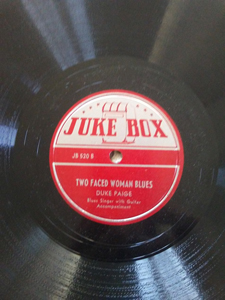 story. She did some research and found a record my father recorded when he was in his early 20s. I ordered it and another album compilation of early blues tunes which included my dad along with Howlin’ Wolf, John Lee Hooker and Lightnin' Slim. The single arrived with “Ida May” on one side and “Two-Faced Woman" on the other. I rushed over to neighbor Wally Matsura, who still has a record player, and I heard my father's voice singing the kind of music I’d been singing with my band for most of my life! Music I had not grown up with but began singing the minute I discovered it. My favorite line was “I’m kind to little doggies and the birds up in the trees. But I wouldn’t take that woman back, if she begged on bended knee!” I too have always been kind to little dogs and the birds up in the trees, and apparently so was my dad.
story. She did some research and found a record my father recorded when he was in his early 20s. I ordered it and another album compilation of early blues tunes which included my dad along with Howlin’ Wolf, John Lee Hooker and Lightnin' Slim. The single arrived with “Ida May” on one side and “Two-Faced Woman" on the other. I rushed over to neighbor Wally Matsura, who still has a record player, and I heard my father's voice singing the kind of music I’d been singing with my band for most of my life! Music I had not grown up with but began singing the minute I discovered it. My favorite line was “I’m kind to little doggies and the birds up in the trees. But I wouldn’t take that woman back, if she begged on bended knee!” I too have always been kind to little dogs and the birds up in the trees, and apparently so was my dad.
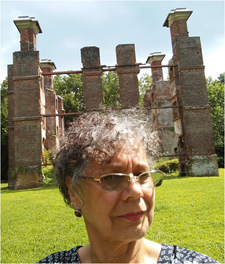 I flew to Washington where I rented a car to drive through the stunning Virginian countryside to Norfolk. One of the many lucky aspects of this story was my cousin Karen Paige who happened to be a historian. She suggested I stop off at the Rosewell Plantation outside of Gloucester. Rosewell was one of the largest plantations in the south and according to Karen had been built by Mann Page. Evidence points to the possibility he was one of our ancestors. Current efforts to compare DNA with his ancestors are underway. George Washington had been a frequent visitor and rumor had it, they used to discuss the Declaration as it was being developed. Rosewell eventually burned down, but the ruins and property had become a landmark. I spent a good hour by myself in the quiet humid summer heat surrounded by the ruins and the forest on its edges and the huge fields where the slaves toiled. I tried to imagine the people and activities of the past, and it summoned up nothing but sadness. A handful of white oppressors surrounded by over a hundred people serving them with no reward other than grief and fear. People who could be separated from their children and sold at a moment's notice. Sold!
I flew to Washington where I rented a car to drive through the stunning Virginian countryside to Norfolk. One of the many lucky aspects of this story was my cousin Karen Paige who happened to be a historian. She suggested I stop off at the Rosewell Plantation outside of Gloucester. Rosewell was one of the largest plantations in the south and according to Karen had been built by Mann Page. Evidence points to the possibility he was one of our ancestors. Current efforts to compare DNA with his ancestors are underway. George Washington had been a frequent visitor and rumor had it, they used to discuss the Declaration as it was being developed. Rosewell eventually burned down, but the ruins and property had become a landmark. I spent a good hour by myself in the quiet humid summer heat surrounded by the ruins and the forest on its edges and the huge fields where the slaves toiled. I tried to imagine the people and activities of the past, and it summoned up nothing but sadness. A handful of white oppressors surrounded by over a hundred people serving them with no reward other than grief and fear. People who could be separated from their children and sold at a moment's notice. Sold!
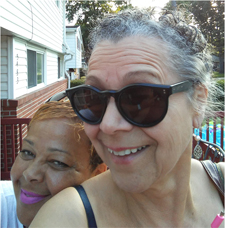 I finally made it to Norfolk and the incredible embrace of my cousins. My dad and his three brothers and one sister had all passed on but many of the cousins lived close and I got to meet many of them. I stayed with cousin Sylvia, and we couldn’t stop laughing and talking. It was like old home week.
I finally made it to Norfolk and the incredible embrace of my cousins. My dad and his three brothers and one sister had all passed on but many of the cousins lived close and I got to meet many of them. I stayed with cousin Sylvia, and we couldn’t stop laughing and talking. It was like old home week.
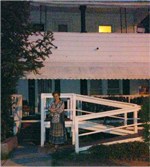
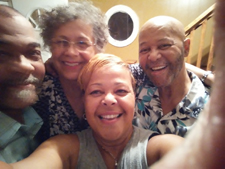 They threw a big party for me at the house Deutrelle grew up in and two of my cousins lived in. I saw where my dad practiced piano. He was so good "he could play with one hand and it sounded like two!"
They threw a big party for me at the house Deutrelle grew up in and two of my cousins lived in. I saw where my dad practiced piano. He was so good "he could play with one hand and it sounded like two!"
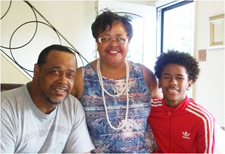 My cousin Pam brought me to the house of another cousin who told me my dad stayed with them when he was in town. His fondest memory was driving Deutrelle's shiny brown Cadillac to school to impress his classmates.
My cousin Pam brought me to the house of another cousin who told me my dad stayed with them when he was in town. His fondest memory was driving Deutrelle's shiny brown Cadillac to school to impress his classmates.
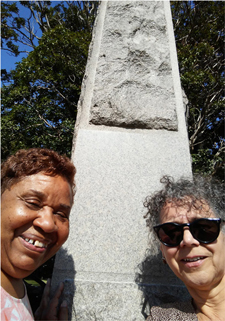 My cousin Karen Paige, the historian, gave me a tour of the city and all the Paige landmarks including the monument to our great grandfather R.G.L. Paige in the black cemetery he had purchased and where other Paiges rest. It was now owned by the city. What I discovered about my lineage was extraordinary, and suddenly so many things about me began to make sense.
My cousin Karen Paige, the historian, gave me a tour of the city and all the Paige landmarks including the monument to our great grandfather R.G.L. Paige in the black cemetery he had purchased and where other Paiges rest. It was now owned by the city. What I discovered about my lineage was extraordinary, and suddenly so many things about me began to make sense.
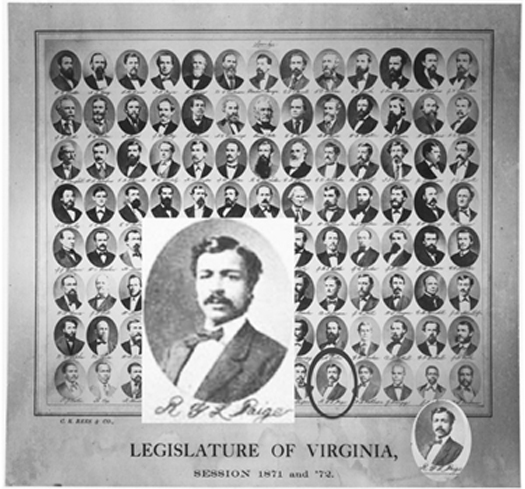
My great grandfather was a man named Richard Gault Lesley Paige. Despite having been born into slavery, against all odds he became one of the first black lawyers in Norfolk, popular with both black and white clients. He was also one of the first black delegates elected to the Virginia legislature after the Civil War. From the Virginia Encyclopedia: R. G. L. Paige was a Republican member of the House of Delegates (1871–1875, 1879–1882) and possibly the first African American lawyer in Norfolk and one of the first in Virginia. Born into slavery in the city of Norfolk, Paige escaped to Philadelphia about 1857 and eventually settled in Boston. After the American Civil War (1861–1865) and the abolition of slavery, he returned to Norfolk. There he purchased the local African American burial ground (later Mount Olive Cemetery) and in 1871 won election to the House of Delegates. In the General Assembly Paige lobbied for civil rights, served as a delegate to the Republican National Convention, and won a patronage appointment as an assistant clerk at the Norfolk customs house. In 1880 he delivered a speech against lynching that was widely reprinted, but no legislation resulted. That same year he threatened to, but in the end did not, sue a Richmond theater company that refused to seat him. From 1882 to 1885 he served as secretary of the curators of the Hampton Normal and Agricultural Institute. In 1882 he helped pass legislation chartering the Virginia Building and Savings Association and became a founding member of its board of directors. Paige died in 1904.
From the Journal of Negro History “Paige and Harris were among the principal leaders of the House, and certainly, few were the men in that house whether democrats or republicans who could outrank them in oratory or public debate.”
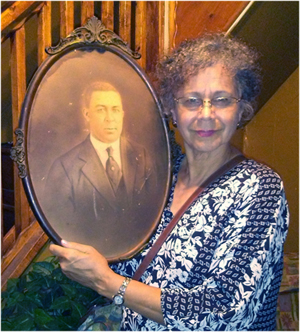 One of his sons, RGL Paige II, my grandfather, was also a distinguished lawyer in Norfolk, and all of my cousins remember "Daddy Paige" and his wife, Lillian Marcella Land, as being exceptionally kind and loving people.
One of his sons, RGL Paige II, my grandfather, was also a distinguished lawyer in Norfolk, and all of my cousins remember "Daddy Paige" and his wife, Lillian Marcella Land, as being exceptionally kind and loving people.
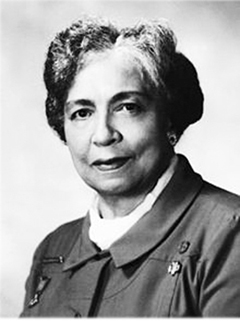 My great aunt, Dorothy Boulding Ferebee, R.G.L. Paige’s granddaughter, was a medical activist.
My great aunt, Dorothy Boulding Ferebee, R.G.L. Paige’s granddaughter, was a medical activist.
Wikipedia: “Ferebee was affiliated with Howard University's Medical school, starting in 1927 as an instructor of Obstetrics, and later as the medical director of the Howard University Health Service from 1949-1968, all while maintaining her own private practice. She was also instrumental in establishing the Southeast Neighborhood House, an adjunct of the whites-only Friendship House medical center, to provide medical care and other community services to African-Americans in Washington, D.C. She served as the first medical director for the Mississippi Health Project, "a seven year program stands as one of the most impressive examples of voluntary public health work ever conducted by black physicians in the Jim Crow South, touching thousands of black Mississippians at a time when they had virtually no access to professional medical care"
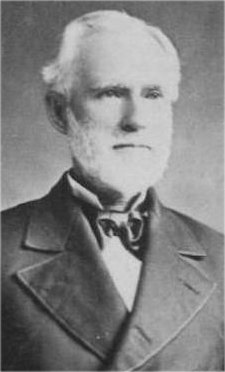 I was interested in RGL's parentage, and here we have some differing stories. My historian cousin Karen is in the process of piecing together evidence that RGL was the result of a union between a white man, Richard Lucian Page, a United States Navy officer who joined the Confederate States Navy and later became a brigadier general in the Confederate States Army during the American Civil War, and his housekeeper Catherine. It is through him we trace back to Rosewell and, through my research, back to 1195 in England and a bishop named Pageham. But other sources claim his father was possibly a Thomas Paige. Karen continues to research and with DNA tests so easily accessible we are getting closer to the truth.
I was interested in RGL's parentage, and here we have some differing stories. My historian cousin Karen is in the process of piecing together evidence that RGL was the result of a union between a white man, Richard Lucian Page, a United States Navy officer who joined the Confederate States Navy and later became a brigadier general in the Confederate States Army during the American Civil War, and his housekeeper Catherine. It is through him we trace back to Rosewell and, through my research, back to 1195 in England and a bishop named Pageham. But other sources claim his father was possibly a Thomas Paige. Karen continues to research and with DNA tests so easily accessible we are getting closer to the truth.
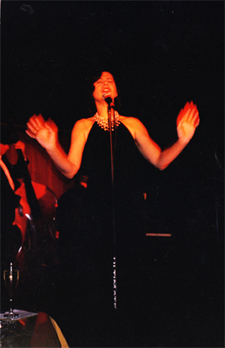 So now, many of my inclinations are so easily explained. From my natural love of African American jazz and blues and the bands I’ve put together to sing and perform this music, to my activism. My political activism has always surprised me because I spent my life as an artist, focused on the ideas and activities of the art world, but I could never tolerate what I perceived as an injustice or abuse of the innocent and would stand up to it and take action when I could. In 1989 I joined in the fight against an invasion of anti-abortion activists Operation Rescue and we drove them out of Los Angeles. I successfully initiated and fought to get a law changed to make it illegal to tie a dog up in the backyard as a lifestyle in Los Angeles, and with very little support I fought against the illegal installation of gates in my community. Although I was able to take it as far as suing the city, it was a battle I lost. So when I read about my great grandfather's unsuccessful fight to have legislation created to address lynching, I felt he would have understood and been proud of my efforts to launch a lonely fight against the prevailing winds to right a wrong no matter how small. Besides, in the end, The Neighborhood News emerged out of that effort and the recognition of the need to keep the community informed and connected and celebrated which we have been doing now for 10 years. The feeling of my ancestors cheering me on is palpable.
So now, many of my inclinations are so easily explained. From my natural love of African American jazz and blues and the bands I’ve put together to sing and perform this music, to my activism. My political activism has always surprised me because I spent my life as an artist, focused on the ideas and activities of the art world, but I could never tolerate what I perceived as an injustice or abuse of the innocent and would stand up to it and take action when I could. In 1989 I joined in the fight against an invasion of anti-abortion activists Operation Rescue and we drove them out of Los Angeles. I successfully initiated and fought to get a law changed to make it illegal to tie a dog up in the backyard as a lifestyle in Los Angeles, and with very little support I fought against the illegal installation of gates in my community. Although I was able to take it as far as suing the city, it was a battle I lost. So when I read about my great grandfather's unsuccessful fight to have legislation created to address lynching, I felt he would have understood and been proud of my efforts to launch a lonely fight against the prevailing winds to right a wrong no matter how small. Besides, in the end, The Neighborhood News emerged out of that effort and the recognition of the need to keep the community informed and connected and celebrated which we have been doing now for 10 years. The feeling of my ancestors cheering me on is palpable.
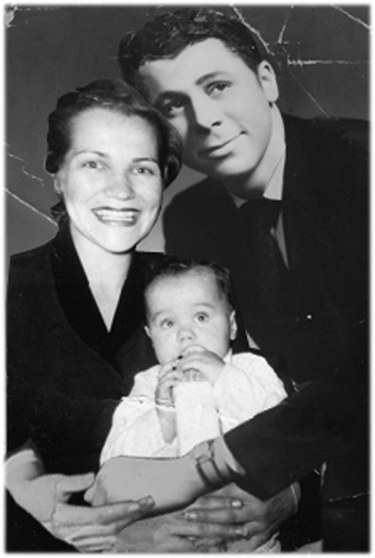 I have had the extraordinary good fortune to have discovered remarkably loving kin and to feel embraced by their welcoming home. It has been an emotional landscape changer. To discover I have genetic roots in important events in our American history and ancestors who fought against all odds for justice and relief, allows me to rewrite the family codes I'd been operating under and understand, embrace and celebrate my genetic heritage in the Norfolk Paige line.
I have had the extraordinary good fortune to have discovered remarkably loving kin and to feel embraced by their welcoming home. It has been an emotional landscape changer. To discover I have genetic roots in important events in our American history and ancestors who fought against all odds for justice and relief, allows me to rewrite the family codes I'd been operating under and understand, embrace and celebrate my genetic heritage in the Norfolk Paige line.
Photo collaged together of my mother, father and myself.
 story. She did some research and found a record my father recorded when he was in his early 20s. I ordered it and another album compilation of early blues tunes which included my dad along with Howlin’ Wolf, John Lee Hooker and Lightnin' Slim. The single arrived with “Ida May” on one side and “Two-Faced Woman" on the other. I rushed over to neighbor Wally Matsura, who still has a record player, and I heard my father's voice singing the kind of music I’d been singing with my band for most of my life! Music I had not grown up with but began singing the minute I discovered it. My favorite line was “I’m kind to little doggies and the birds up in the trees. But I wouldn’t take that woman back, if she begged on bended knee!” I too have always been kind to little dogs and the birds up in the trees, and apparently so was my dad.
story. She did some research and found a record my father recorded when he was in his early 20s. I ordered it and another album compilation of early blues tunes which included my dad along with Howlin’ Wolf, John Lee Hooker and Lightnin' Slim. The single arrived with “Ida May” on one side and “Two-Faced Woman" on the other. I rushed over to neighbor Wally Matsura, who still has a record player, and I heard my father's voice singing the kind of music I’d been singing with my band for most of my life! Music I had not grown up with but began singing the minute I discovered it. My favorite line was “I’m kind to little doggies and the birds up in the trees. But I wouldn’t take that woman back, if she begged on bended knee!” I too have always been kind to little dogs and the birds up in the trees, and apparently so was my dad.  I flew to Washington where I rented a car to drive through the stunning Virginian countryside to Norfolk. One of the many lucky aspects of this story was my cousin Karen Paige who happened to be a historian. She suggested I stop off at the Rosewell Plantation outside of Gloucester. Rosewell was one of the largest plantations in the south and according to Karen had been built by Mann Page. Evidence points to the possibility he was one of our ancestors. Current efforts to compare DNA with his ancestors are underway. George Washington had been a frequent visitor and rumor had it, they used to discuss the Declaration as it was being developed. Rosewell eventually burned down, but the ruins and property had become a landmark. I spent a good hour by myself in the quiet humid summer heat surrounded by the ruins and the forest on its edges and the huge fields where the slaves toiled. I tried to imagine the people and activities of the past, and it summoned up nothing but sadness. A handful of white oppressors surrounded by over a hundred people serving them with no reward other than grief and fear. People who could be separated from their children and sold at a moment's notice. Sold!
I flew to Washington where I rented a car to drive through the stunning Virginian countryside to Norfolk. One of the many lucky aspects of this story was my cousin Karen Paige who happened to be a historian. She suggested I stop off at the Rosewell Plantation outside of Gloucester. Rosewell was one of the largest plantations in the south and according to Karen had been built by Mann Page. Evidence points to the possibility he was one of our ancestors. Current efforts to compare DNA with his ancestors are underway. George Washington had been a frequent visitor and rumor had it, they used to discuss the Declaration as it was being developed. Rosewell eventually burned down, but the ruins and property had become a landmark. I spent a good hour by myself in the quiet humid summer heat surrounded by the ruins and the forest on its edges and the huge fields where the slaves toiled. I tried to imagine the people and activities of the past, and it summoned up nothing but sadness. A handful of white oppressors surrounded by over a hundred people serving them with no reward other than grief and fear. People who could be separated from their children and sold at a moment's notice. Sold! I finally made it to Norfolk and the incredible embrace of my cousins. My dad and his three brothers and one sister had all passed on but many of the cousins lived close and I got to meet many of them. I stayed with cousin Sylvia, and we couldn’t stop laughing and talking. It was like old home week.
I finally made it to Norfolk and the incredible embrace of my cousins. My dad and his three brothers and one sister had all passed on but many of the cousins lived close and I got to meet many of them. I stayed with cousin Sylvia, and we couldn’t stop laughing and talking. It was like old home week. 
 They threw a big party for me at the house Deutrelle grew up in and two of my cousins lived in. I saw where my dad practiced piano. He was so good "he could play with one hand and it sounded like two!"
They threw a big party for me at the house Deutrelle grew up in and two of my cousins lived in. I saw where my dad practiced piano. He was so good "he could play with one hand and it sounded like two!"  My cousin Pam brought me to the house of another cousin who told me my dad stayed with them when he was in town. His fondest memory was driving Deutrelle's shiny brown Cadillac to school to impress his classmates.
My cousin Pam brought me to the house of another cousin who told me my dad stayed with them when he was in town. His fondest memory was driving Deutrelle's shiny brown Cadillac to school to impress his classmates.  My cousin Karen Paige, the historian, gave me a tour of the city and all the Paige landmarks including the monument to our great grandfather R.G.L. Paige in the black cemetery he had purchased and where other Paiges rest. It was now owned by the city. What I discovered about my lineage was extraordinary, and suddenly so many things about me began to make sense.
My cousin Karen Paige, the historian, gave me a tour of the city and all the Paige landmarks including the monument to our great grandfather R.G.L. Paige in the black cemetery he had purchased and where other Paiges rest. It was now owned by the city. What I discovered about my lineage was extraordinary, and suddenly so many things about me began to make sense. 
My great grandfather was a man named Richard Gault Lesley Paige. Despite having been born into slavery, against all odds he became one of the first black lawyers in Norfolk, popular with both black and white clients. He was also one of the first black delegates elected to the Virginia legislature after the Civil War. From the Virginia Encyclopedia: R. G. L. Paige was a Republican member of the House of Delegates (1871–1875, 1879–1882) and possibly the first African American lawyer in Norfolk and one of the first in Virginia. Born into slavery in the city of Norfolk, Paige escaped to Philadelphia about 1857 and eventually settled in Boston. After the American Civil War (1861–1865) and the abolition of slavery, he returned to Norfolk. There he purchased the local African American burial ground (later Mount Olive Cemetery) and in 1871 won election to the House of Delegates. In the General Assembly Paige lobbied for civil rights, served as a delegate to the Republican National Convention, and won a patronage appointment as an assistant clerk at the Norfolk customs house. In 1880 he delivered a speech against lynching that was widely reprinted, but no legislation resulted. That same year he threatened to, but in the end did not, sue a Richmond theater company that refused to seat him. From 1882 to 1885 he served as secretary of the curators of the Hampton Normal and Agricultural Institute. In 1882 he helped pass legislation chartering the Virginia Building and Savings Association and became a founding member of its board of directors. Paige died in 1904.
From the Journal of Negro History “Paige and Harris were among the principal leaders of the House, and certainly, few were the men in that house whether democrats or republicans who could outrank them in oratory or public debate.”
 One of his sons, RGL Paige II, my grandfather, was also a distinguished lawyer in Norfolk, and all of my cousins remember "Daddy Paige" and his wife, Lillian Marcella Land, as being exceptionally kind and loving people.
One of his sons, RGL Paige II, my grandfather, was also a distinguished lawyer in Norfolk, and all of my cousins remember "Daddy Paige" and his wife, Lillian Marcella Land, as being exceptionally kind and loving people.  My great aunt, Dorothy Boulding Ferebee, R.G.L. Paige’s granddaughter, was a medical activist.
My great aunt, Dorothy Boulding Ferebee, R.G.L. Paige’s granddaughter, was a medical activist. Wikipedia: “Ferebee was affiliated with Howard University's Medical school, starting in 1927 as an instructor of Obstetrics, and later as the medical director of the Howard University Health Service from 1949-1968, all while maintaining her own private practice. She was also instrumental in establishing the Southeast Neighborhood House, an adjunct of the whites-only Friendship House medical center, to provide medical care and other community services to African-Americans in Washington, D.C. She served as the first medical director for the Mississippi Health Project, "a seven year program stands as one of the most impressive examples of voluntary public health work ever conducted by black physicians in the Jim Crow South, touching thousands of black Mississippians at a time when they had virtually no access to professional medical care"
 I was interested in RGL's parentage, and here we have some differing stories. My historian cousin Karen is in the process of piecing together evidence that RGL was the result of a union between a white man, Richard Lucian Page, a United States Navy officer who joined the Confederate States Navy and later became a brigadier general in the Confederate States Army during the American Civil War, and his housekeeper Catherine. It is through him we trace back to Rosewell and, through my research, back to 1195 in England and a bishop named Pageham. But other sources claim his father was possibly a Thomas Paige. Karen continues to research and with DNA tests so easily accessible we are getting closer to the truth.
I was interested in RGL's parentage, and here we have some differing stories. My historian cousin Karen is in the process of piecing together evidence that RGL was the result of a union between a white man, Richard Lucian Page, a United States Navy officer who joined the Confederate States Navy and later became a brigadier general in the Confederate States Army during the American Civil War, and his housekeeper Catherine. It is through him we trace back to Rosewell and, through my research, back to 1195 in England and a bishop named Pageham. But other sources claim his father was possibly a Thomas Paige. Karen continues to research and with DNA tests so easily accessible we are getting closer to the truth.  So now, many of my inclinations are so easily explained. From my natural love of African American jazz and blues and the bands I’ve put together to sing and perform this music, to my activism. My political activism has always surprised me because I spent my life as an artist, focused on the ideas and activities of the art world, but I could never tolerate what I perceived as an injustice or abuse of the innocent and would stand up to it and take action when I could. In 1989 I joined in the fight against an invasion of anti-abortion activists Operation Rescue and we drove them out of Los Angeles. I successfully initiated and fought to get a law changed to make it illegal to tie a dog up in the backyard as a lifestyle in Los Angeles, and with very little support I fought against the illegal installation of gates in my community. Although I was able to take it as far as suing the city, it was a battle I lost. So when I read about my great grandfather's unsuccessful fight to have legislation created to address lynching, I felt he would have understood and been proud of my efforts to launch a lonely fight against the prevailing winds to right a wrong no matter how small. Besides, in the end, The Neighborhood News emerged out of that effort and the recognition of the need to keep the community informed and connected and celebrated which we have been doing now for 10 years. The feeling of my ancestors cheering me on is palpable.
So now, many of my inclinations are so easily explained. From my natural love of African American jazz and blues and the bands I’ve put together to sing and perform this music, to my activism. My political activism has always surprised me because I spent my life as an artist, focused on the ideas and activities of the art world, but I could never tolerate what I perceived as an injustice or abuse of the innocent and would stand up to it and take action when I could. In 1989 I joined in the fight against an invasion of anti-abortion activists Operation Rescue and we drove them out of Los Angeles. I successfully initiated and fought to get a law changed to make it illegal to tie a dog up in the backyard as a lifestyle in Los Angeles, and with very little support I fought against the illegal installation of gates in my community. Although I was able to take it as far as suing the city, it was a battle I lost. So when I read about my great grandfather's unsuccessful fight to have legislation created to address lynching, I felt he would have understood and been proud of my efforts to launch a lonely fight against the prevailing winds to right a wrong no matter how small. Besides, in the end, The Neighborhood News emerged out of that effort and the recognition of the need to keep the community informed and connected and celebrated which we have been doing now for 10 years. The feeling of my ancestors cheering me on is palpable. I have had the extraordinary good fortune to have discovered remarkably loving kin and to feel embraced by their welcoming home. It has been an emotional landscape changer. To discover I have genetic roots in important events in our American history and ancestors who fought against all odds for justice and relief, allows me to rewrite the family codes I'd been operating under and understand, embrace and celebrate my genetic heritage in the Norfolk Paige line.
I have had the extraordinary good fortune to have discovered remarkably loving kin and to feel embraced by their welcoming home. It has been an emotional landscape changer. To discover I have genetic roots in important events in our American history and ancestors who fought against all odds for justice and relief, allows me to rewrite the family codes I'd been operating under and understand, embrace and celebrate my genetic heritage in the Norfolk Paige line. Photo collaged together of my mother, father and myself.
